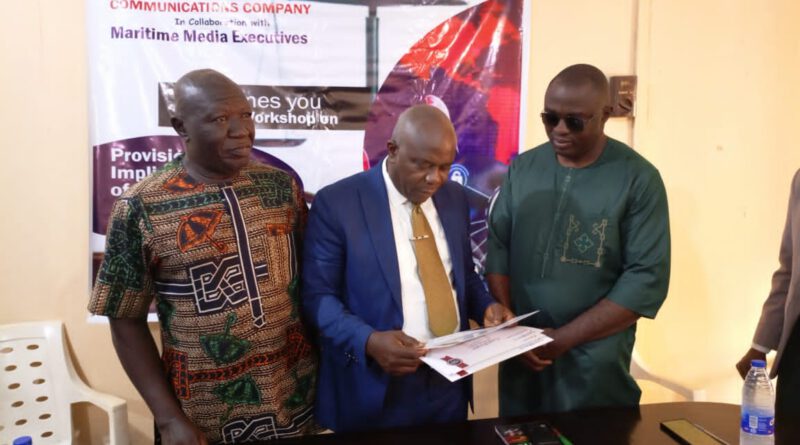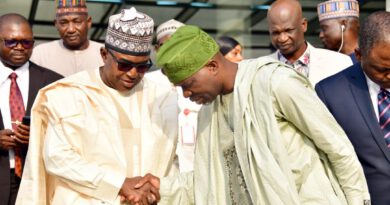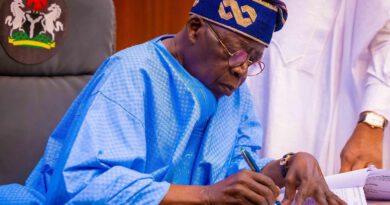Cybercrime Act: Law Not Targeted Against Media Practitioners – Lagos Lawyer
By Raheem Ibrahim
Controversy over the Cybercrime Act 2015 enacted by the federal government, allegedly aimed to tackle journalists from adequate reporting has been laid to rest as a Lagos based lawyer cleared the misinterpretation.
The Lawyer, Chief Abdullahi Tony Dania explained that the Cybercrime Act 2015, which was enacted to provide unified legal, regulatory and institutional framework for the prohibition, detection, investigation and prosecution of cybercrimes in Nigeria is not targeted against trained and genuine journalists.
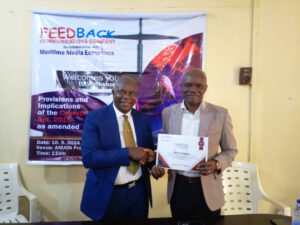
Speaking to journalists at a workshop organised by Feedback Communications Company in collaboration with Maritime Media Executives themed ‘Provisions and Implications of the Cybercrime Act 2015 as Amended ‘ on 10th September, 2024, he noted that spreading fake and unverified news could blackmail a person’s reputation.
It will be recalled that the enacted law received criticism from many quarters that it was aimed to tame journalists from performing their statutory professional job and hinder them from publishing accurate reports.
Barrister Dania who urged journalists to be courteous in their reportage explained that Cybercrime involves criminal use of digital technology for cyber bullying, cyber stalking or circulation of false information.
He implored journalists to always verify every information before publishing, saying “If you are not sure of a particular information about a person, Organization or the government, do not say anything about it”.
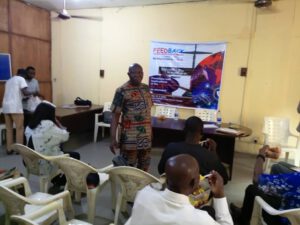
He added that journalists should have justifiable evidences before circulation of news publications, “Make sure you have voice or video records or signed statement of the individual involved”.
While pointing out that there are situations where a wrong information is published and the individual involved seeks legal action against the journalist in question, the journalist can apologise and withdraw such publication.
He said, “If you are convicted of libel, cyber bullying or cyber stalking, apologise and retract the information”.
Barrister Tony stated that the Freedom of Information Act (FOIA) which gives journalist the freedom to express themselves should not be taken for granted .
He however opined that a task force that regulates the use of cyberspace be created by the government, saying “FOI Act is a benefit to journalism. It would have been better if a task force is created to sanction offenders of the Cybercrime Act ”
In his contribution, Mr Ismail Aniemu, Publisher of JournalNG who explained the grave consequences of Cybercrime as it concerns the press, highlighted prevention and management of Cybercrime pitfalls.
Noting that journalism practice has evolved from the use of analog tools to the use of digital tools which makes it easier, he advised that journalists should continue to maintain their integrity while carrying out their activities.
He said, “Technology has made media faster than what it used to be. Press law has moved from libel and slander to Cybercrime.”
He revealed that from his findings that some journalists are not aware of the Cybercrime Act, but advised them to be guided with the aim of rebuilding and developing the society in their write-up.
Aniemu also advised that correction and apology should be made immediately there is an allegation of circulation of wrong information.
”Some journalists do not know about the Cybercrime Act. The future is now online. As fast as a news story is spread, lies, mistakes and blunders are spread too. Ensure that you are truthful. Journalism is a social responsibility and should be practiced with integrity ” he said.

